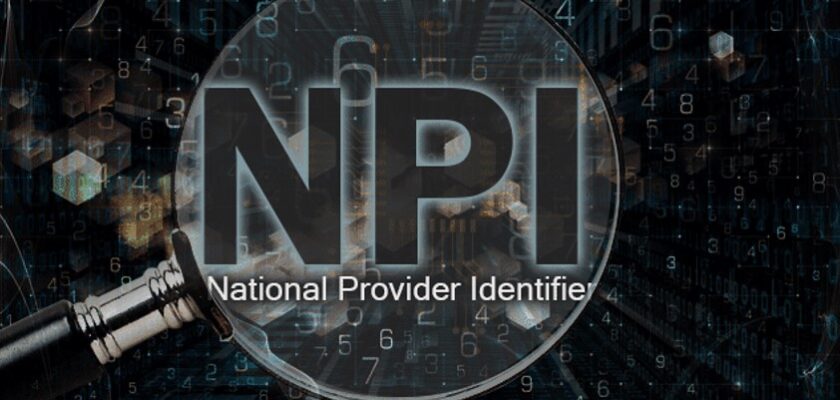An erroneous or missing NPI number is one of the most prevalent causes of rejected medical claims and billing problems in the medical industry. Claims for medical coverage sent into Medicare, Medicaid, or any other health plan that does not include a correct NPI are not paid.
An NPI, or National Provider Identifier, is a one-of-a-kind identifying number assigned to insured healthcare providers. This number was designed to make the electronic transmission of health information more efficient and timely. When conducting administrative and financial activities relating to patient care, covered healthcare providers, health plans, and healthcare clearinghouses must utilise NPI database.
What Are NPI Numbers?

Source:lookup.org
An individual healthcare practitioner or a healthcare business may be identified by their unique NPI number, abbreviated as “National Provider Identifier”, and consists of 10 digits. An NPI number is sent to other providers, employers, health plans, and payers to facilitate billing and payment.
All healthcare providers that fall within HIPAA’s coverage, health plans, and healthcare clearinghouses must use NPI numbers in the administrative and financial transactions that the law mandates.
Why Is It Necessary To Have An NPI Number?
Before the establishment of NPI numbers, health plans and government payers were responsible for providing providers and suppliers in the healthcare industry with identity numbers. Because the identification numbers needed to be standardized, a single provider was required to use numerous identity numbers. The different health plans the provider was enrolled in provided these multiple identification numbers. Because of this, the procedure of submitting claims by the providers became more cumbersome. Consequently, various health plans often give the same identification number to several healthcare providers.
Within the healthcare system context, the NPI Final Rule created a standard for a one-of-a-kind health identifier that medical professionals must use. As a result, the procedure for filing claims is made more accessible by the national average, lessening the administrative responsibilities placed on healthcare providers.
When communicating any health information in electronic form in conjunction with a transaction, providers are obligated to use their NPI. According to the NPI Final Rule, “the NPI will enhance Medicare and Medicaid programs, as well as other federal health programmes and private health programmes, thereby improving the efficiency and effectiveness of the healthcare industry in general.” It will be accomplished by simplifying healthcare administration and facilitating efficient electronic transmission of certain health information.
Who Needs An NPI?

Source:sybridmd.com
Obtaining a National Provider Identifier (NPI) is obligatory for all individuals and organizations that fulfil the requirements of the definition of a healthcare provider as outlined in 45 CFR 160.103 and that engage in activities or make use of health records that are governed by the regulations of HIPAA. For example, providers who send health information electronically, health plan clearinghouses, and health plans share protected health information with covered entities that require access to protected health information.
In addition, these covered entities include healthcare organizations that transmit protected health information to other covered entities. You must obtain a National Provider Identifier (NPI) to charge federally sponsored programmes for your services, no matter whether you are a healthcare provider, a provider under HIPAA, or a supplier. Before enrolling in Medicare, providers also require a National Provider Identifier (NPI).
Which Of These Two Types Of NPI Providers Are There?
Two different kinds of providers may hand out NPI numbers: type 1 NPI providers and organize 2 NPI providers. Individuals, such as single owners, dentists, doctors, and surgeons, are considered part of the Type 1 NPI category. A single NPI may be issued to an individual provider. Organizations fall within the category of Type 2 NPIs. Examples of such entities are healthcare facilities, health systems, hospitals, physician groups, assisted living facilities, and medical professionals who have incorporated their practices.
When Did NPI Numbers Begin?

Source:verisys.com
In July 1993, the Centers for Medicare and Medicaid Services (CMS) began developing an identification system for healthcare providers to meet their respective programmes’ needs and the need for a national identification system for all providers. This project aimed to create a system that would be universally applicable to all providers. As a result, the NPI was designated as the standard with the publication of the NPI Final Rule on January 23, 2004.
In 2007, the CMS switched from using UPINs to NPI numbers as the preferred provider identification number. This decision resulted in the termination of the UPIN Registry. It was done to make submitting claims more standardised and straightforward.
What Are the Steps To Obtaining An NPI Number?
Applying for a National Provider Identifier (NPI) number through NPPES is the quickest method to obtain a National Provider Identification (NPI) number (NPPES). The process of filling out the application should take at most 20 minutes, and a number may be obtained from the NPI in as little as ten days. However, before accessing the NPPES, individual providers must first register for an account using the Identity & Access Management System, where they will also generate a username and password.
Providers can also submit a paper application for an NPI number or have an organisation apply on their behalf. On the CMS website, you can get the whole set of instructions.
The claim must be filed to a health plan with a valid, registered NPI. So it is because HIPAA laws mandate the use of NPIs to keep track of healthcare services and payments.
How To Locate An NPI Number?

Source:researchbite.com
One may use several approaches when looking for an NPI for a provider or an organisation. The NPPES NPI Registry is the website that provides access to the official NPI lookup. Everyone is welcome to use this no-cost service. The NPI number or the name may be used as a starting point.
The search results contain the National Provider Identifier (NPI) number, the provider’s first and last name, an icon indicating the kind of NPI, the principal practice location and phone number, and the powerful taxonomy. The outcomes are shown in the window for the search results, from which they may be downloaded or, as an alternative, obtained via the use of an application programming interface.
Final Words
Verification of the National Provider Identifier (NPI) is a crucial component in combating Medicare fraud. Other essential features include standardised provider identities. When a provider diagnoses a patient’s condition, writes prescriptions, or orders medical equipment and supplies, the NPI number is used to help match the physician’s identification. In addition, a valid NPI number does not suggest that the practitioner is appropriately licenced or has not been excluded or sanctioned; combining all these parts of credentialing helps prevent healthcare fraud.

